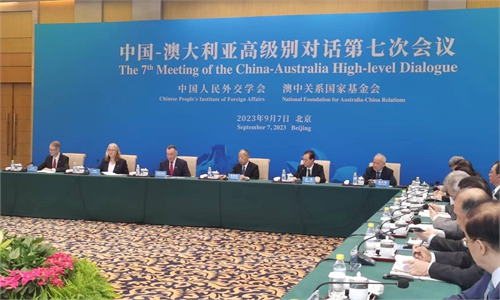
Illustration: Chen Xia/Global Times
In January 2020, I attended the 6th China-Australia High-level Dialogue in Sydney's Intercontinental Hotel near the picturesque Circular Quay. Although bilateral relations between China and Australia already started to chill after the then Australian government unwarrantedly accused China of "political interference" and recklessly imposed a blanket ban on Huawei, both sides during the meeting positively expressed a desire to put an end to the decline of the relationship. We pledged to meet again in the following year in Beijing to seek further mutual understanding and promote improvement to the bilateral ties.
No one had anticipated that China-Australia relations would plunge to their historically lowest point as the Morrison administration continued to align with the US' Indo-Pacific Strategy and further antagonize China as an opponent. Although both sides had hoped for the Beijing rendezvous, regretfully, it did not materialize.
After the Labor government took office in May 2022, glimmers of hope for the improvement of the bilateral relations coalesced into brighter glows as the Albanese team put a decisive end to the anti-China "megaphone diplomacy" adopted by the previous administration. China and Australia worked together to renew contacts, leading to a bilateral summit in Bali six months later, in November, between President Xi Jinping and Albanese. In December, China's Foreign Minister Wang Yi reached a consensus with his Australian counterpart Penny Wong, who was visiting Beijing on the 50th anniversary of the diplomatic relationship between China and Australia, that the two sides should maintain high-level engagement, and commence or restart dialogue in areas including bilateral relations, economy and trade, and regional and international issues.
I had a sense of déjà vu when I walked into the spacious meeting room to participate in the 7th round of the dialogue, which finally took place on September 7 in the Diaoyutai State Guesthouse compound. The Australian side sent an 18-member delegation consisting of current and former government officials, and representatives from the business, education and academic circles to participate in the "track 1.5" dialogue. Amid pleasantries and formalities, there were indeed genuine aspirations to restore the relationship which had been insensitively and viciously devastated in the past three years.
The atmosphere during this year's dialogue was encouragingly candid, friendly and warm. While stating differences in the perceptions and assessments of various matters and topics, both sides also tried their best to identify common interests.
Disparities in the two countries' systems of governance and cultural traditions do exist, as in any other international relations, but the differences should not be amplified or even distorted to hinder or sabotage the stability of bilateral collaboration and exchanges.
There have been no historical or territorial disputes between the two countries and China has never posed any threat to Australia. Australia's close ties with the US should not naturally position Canberra as an adversary of China. As Li Zhaoxing, China's former foreign minister and head of the Chinese delegation to this year's dialogue said, Australia's bonds with its allies should not be in conflict with its ties with its other partners.
Despite the diplomatic upheavals during the past several years, China-Australia trade relations have been developing with vigorous dynamism. China has remained Australia's biggest trade partner for 14 years. Frictions and disputes can take place as in any international trade relations, but such disagreements should not be ideologized and politicized with the cold war mentality, which would only exacerbate problems rather than bring about resolutions.
It is heartening to see China and Australia have been carrying out proactive and conducive discussions and negotiations to seek solutions to the existing trade disputes. The recent resolution of the barley case is another promising step to steer the trade relations to the track of full recovery and consolidation with a constructive spirit on both sides.
During the sessions at the dialogue, I was thrilled to see a news alert on my phone that Anthony Albanese, Australia's Prime Minister, affirmed his long-anticipated visit to China within the year. The visit will obviously serve as a very positive move which will not only stabilize the bilateral relations, but also revitalize and strengthen the comprehensive strategic partnership.
China and Australia are two important countries and key economies in the Asia-Pacific. Our proactive and constructive partnership will not only contribute to the economic development and cultural diversity in both countries, but also the peace, stability and prosperity of the region, and also of the world.
I look forward to the new stage our bilateral relations will achieve when the next round of High-level Dialogue takes place in Australia next year.
The author is president of the Chinese Association of Australian Studies and director of the Australian Studies Centre at East China Normal University. opinion@globaltimes.com.cn

